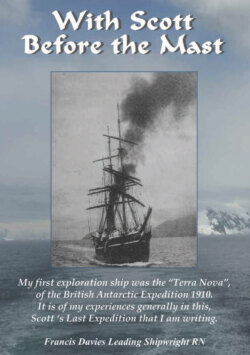Читать книгу With Scott Before The Mast - Francis H. Davies - Страница 6
На сайте Литреса книга снята с продажи.
ОглавлениеPreface by Joy Watts great niece of Francis Davies
When I was a child, my mother often spoke of Great Uncle Frank's Antarctic adventures. His daughter, my cousin Beatrice, always known to the family as Maidie was custodian of her father's trunk holding artefacts and souvenirs from his polar travels. I refer to Francis Davies, Leading Shipwright RN, and Carpenter on the Terra Nova British Antarctic Expedition 1910 -1913.
Occasionally, Maidie would open the trunk and we would peer at the objects before us. A diverse collection, among it penguins’ eggs, lava from Mt. Erebus, charts and photographs, diaorami, tools and items used on Terra Nova and most intriguing to me at the time, a jar containing a seal embryo preserved in spirit. Also in the trunk and most treasured by Maidie was her father's account of his expedition experiences which he named ‘With Scott: Before The Mast’ written under the pseudonym Rudolph.
Francis Davies was born in Plymouth in 1885, where he was brought up in the Lower Crab Tree and Laira Green area of the city, attending Laira Green School. On leaving school and prior to his entry into the Royal Navy, he attained a shipwright's apprenticeship at the Royal Naval Dockyard, Devonport. It was as Shipwright on HMS Vanguard and when working in Devonport, he first heard mention of Captain Scott's plans for an expedition to the Antarctic and that shipwrights were required. Such was his longing for adventure into the unknown, he immediately knew he wanted to be a part of it. He applied, was accepted and duly appointed Leading Shipwright. He joined the British Antarctic Expedition on 30 May 1910 and signed on at Poplar, London.
Mustard Pot used on Terra Nova.
Often called Chippy by his shipmates his many skills were always in demand and constantly put to the test both on the voyage and ashore. Beginning with his work in the refit of Terra Nova from a blubber laden whaler, in a very poor state, to an expedition ship. He was meticulous in his most principal task, this being his planning and building of the huts, both the living quarters at Cape Evans for the Southern Party, about which Captain Scott wrote ‘we are simply overwhelmed by it's comfort’ and eventually at Cape Adare for the now Northern Party. The latter having to be rapidly constructed due to the urgency for Terra Nova to leave for New Zealand. Notably, he played a significant part in the emergency work in the engine room during the storm in the Southern Ocean at the very start of the expedition, when all was threatened and disaster narrowly averted. Along the way he was witness to the extraordinary meeting of Terra Nova with Amundsen's ship Fram in the Bay of Whales. To his final Antarctic task, the construction of the Memorial Cross to commemorate Captain Scott and the South Pole Party who perished on their return journey from the Pole. He chose to use the extremely hard Australian jarra wood. The Cross stands to this day on the top of Observation Hill overlooking McMurdo Sound.
Scott's hut at Cape Evans also still stands, both structures are designated Antarctic Historic Monuments. Davies' name is commemorated by Davies Bay, situated between Drake Head and Cape Kinsey, which was discovered in February 1911.
After the expedition Francis Davies served in the First World War and in 1920 took early voluntary retirement from the Royal Navy. He also served on Royal Research Ships Discovery ll and William Scorseby which were engaged in scientific work in the Southern Ocean regions. He later volunteered and served in the Second World War. All his career he sailed on long voyages often lasting years but always returned to the Plymouth area, Drake's country as he so fondly called it. He married Ethel Stephens and then lived at Nicholls Farm, Plympton with their children, Beatrice and Peter. Francis Davies died in Plymouth in 1952, his ashes being scattered on the sea in sight of the National Memorial to Captain Scott and the Polar Party at Mount Wise, Devonport.
My sincere thanks to all who have supported me with this publication. To... David Wilson for his initial encouragement and forward. Robert Headland of the Scott Polar Research Institute for kindly agreeing to proof read. Paul Davies, President of the Devon and Cornwall Polar Society, for his help and advice, and to fellow members of the society including, Michael Tarver and Julie Ellis for their enthusiasm. It was sometime ago when David first introduced me to my patient publisher, Nicholas Reardon, together, 'With Scott: Before the Mast' has at long last been printed.
I dedicate this narrative of adventure to the memory of my cousin Maidie, who first introduced me to the wonders of the heroic age of polar exploration, and those who dared.
I hope you enjoy Chippy's tale.
Joy Watts.
A sketch by Francis Davies of his home Nicholls Farm, Plympton.
